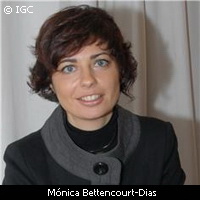Portuguese scientists clinch ERC Starting Grants
Portuguese scientists are gaining a stronger foothold in the research world, as exemplified by five young group leaders who have successfully secured European Research Council (ERC) Starting Grants. It is the largest yield ever for Portuguese researchers in this major EU funding programme. The 5 researchers (3 women and 2 men) will receive between EUR 1-1.5 million to conduct research over a period of 5 years. They are all in their 30s, and 4 of the 5 scientists have established their own research groups. Their investigative efforts will focus primarily on how cells divide, move and age; how bacteria adapt to the environment; and inflammatory responses to disease. The three women, Isabel Gordo, Mónica Bettencourt-Dias and Teresa Teixeira, are working at the Oeiras-based Instituto Gulbenkian de Ciência (IGC), a scientific institute keen on fuelling awareness about biology, biomedicine and genetics. Bruno Santos Silva works at the Instituto de Medicina Molecular in the Portuguese capital city of Lisbon, and Hélder Maiato is based at the Instituto de Biologia Molecular e Celular in Porto. Research on cell division, movement and ageing is high on the agenda for Drs Bettencourt-Dias, Teixeira and Maiato. Their work will prove crucial for researchers who wish to determine what triggers cancer, infertility and age-related syndromes. For her part, Dr Bettencourt-Dias will take the research one step further by investigating how the number and architecture of structures, known as centrioles, are regulated in various cells. What we know so far is that centrioles are key players during cell division for the proper separation of chromosomes. They also have a hand in cell motility, which is needed for diverse physiological processes during development including cell migration during tissue regeneration and embryonic development. Dr Teixeira will investigate individual telomeres, which are stretches of DNA (deoxyribonucleic acid) found at the ends of chromosomes that shorten with each cell division, and the effects of structural changes on the capacity of cells to proliferate. Dr Maiato will further advance the techniques and results already obtained by his research group. The outcome will effectively elucidate the role of a structure called the kinetochore, which plays a pivotal part in cell division. The research conducted by Dr Gordo will offer evolutionary biologists key information about the process of adaptation. Her work will target the bacteria Escherichia coli, effectively shedding light on the biology of bacteria, how they evolve and adapt to new environments, and their diversity. Thanks to the ERC Starting Grant, Dr Santos will put the spotlight on molecules and the processes underlying the inflammatory responses mediated by T cells of the immune system in response to an infection. Immunologists will benefit from his research, as Dr Santos' findings could potentially influence the development of new or more efficient vaccines for chronic infections including tuberculosis. The main objective of the ERC Starting Grants is to provide the support that early career independent researchers need to bring their work to fruition. Scientific excellence is crucial for securing such a grant. Despite their relatively short research experience, somewhere between 2 and 10 years, ERC Starting Grants scientists are well on their way to offering Europeans ambitious and pioneering research.
Countries
Portugal



